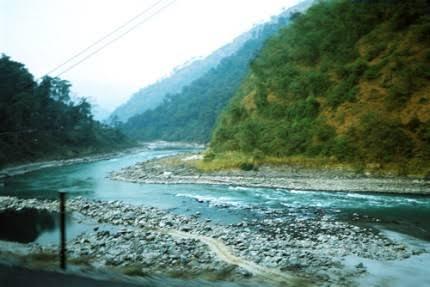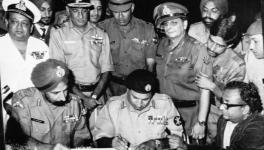No Hope to Resolve Teesta River Issue With Bangladesh Anytime Soon?

Describing the hour-long closed-door meeting with Bangladesh Prime Minister Sheikh Hasina, as “friendly” and “cordial”, the West Bengal Chief Minister Mamata Banerjee maintained silence over the ongoing Teesta water-sharing dispute between the two neighbouring countries. Before meeting PM Hasina, the West Bengal Chief Minister had clearly stated that she is not going to discuss the Teesta water issue. “We will be meeting in Kolkata before she leaves for Bangladesh on Saturday. There is no place for discussion on Teesta river,” PTI quoted West Bengal chief minister as saying.
Hasina was on a two-day visit to India to attend the convocation of Visva-Bharti and to inaugurate Bangladesh Bhavan at Shanti Niketan. This was her second visit to the country in just two months. But the talks between the two countries have failed to make any headway, with Mamata Banerjee turning deaf ear to the water-sharing issue.
The debate over Teesta waters have become critical, as it can gravely strain the relationship between the two countries. All governments, whether UPA or NDA, have emphasised that they want good relations with the neighbours. Modi government has spoken of a "neighbourhood first" policy. Many commentators have said, the policy has not been translated into reality, where relations with neighbours have, in fact, slid backwards. With Bangladesh, India has some unique opportunities. Sheikh Hasina is the most pro-India of the Bangladeshi leaders, something for which, she gets a lot of political flack in Bangladesh from the opposition. But no headway is being made.
Many feel that this has more to do with Bengal politics than with a sagacious policy of good neighbourliness. Mamata Banerjee is flaunting an "ultra-nationalist" position saying that farmers in Bengal will suffer if water is shared. And the BJP, seeking to improve its electoral performance in Bengal, is wary of opposing her on this count.
What is the conflict?
Teesta River, which originates in the eastern Himalayas and flows through Sikkim and West Bengal to merge with Brahamputra in Assam. Jamuna, as they call Teesta in Bangladesh, is one the most controversial issues between the friendly nations India and Bangladesh. Out of the 414 km length of the river, 150-odd is in Sikkin, 123 in West Bengal and the remaining 140 in Bangladesh. Eighty-three per cent of the river catchment area is with India and 17 per cent in the neighbouring Bangladesh.
There are two barrages on Teesta – at Gojoldoba at Jalpaiguri district of West Bengal on the Indian side and at Dalia in Lalmonirhat in Bangladesh. As per the recent surveys in 2017, it has been found that the water in the river has dropped to 100 cumec level in peak summer. This reduction in the waters of Teesta is counted as a reason behind Mamata’s alleged reluctance. In 2017, West Bengal Chief Minister had alleged that the rivers have dried up.
“There is no water in Teesta. If we share its water, then the people of Siliguri, Jalpaiguri, will get no water and the farmers will not be able to carry out agricultural activities... I am saying this because I have seen it,” Mamata had said in 2017. However, West Bengal CM has offered to share water from other rivers to fulfil the neighbouring country’s water demands.
Even the barrages, which were built to hold water in the dry season, have emptied. In a recent report by West Bengal, it has been stated, “While the barrages were planned primarily to provide supplementary irrigation support to aman paddy cultivation during monsoon, subsequently both barrages were used to support boro cultivation during dry season, when there is minimum water in the river.”
Due to unavailability of water reservoir facility and dry barrage, the monsoon water is used to feed the population than keeping it back for the dry seasons. As per the thethirdpole.net report, about one-sixteenth of the water is required to support dry season paddy cultivation, which is perhaps, the main source of livelihood for the people living near to this area.
Series of Negotiations
Series of talks have continued for several decades, but the tension between India’s Central government and West Bengal state has impeded the country from reaching any solution. In 1983, a preliminary arrangement was made, which allocated 39 per cent for India and 36 per cent for Bangladesh.
After registering failures, there was some hope in 2011, when India and Bangladesh reached another agreement – an interim arrangement for 15 years. As per this agreement, India was supposed to get 42.5 per cent and Bangladesh, 37.5 per cent of the Teesta’s waters during the lean season, but the opposition ensured that the deal was not signed after all.
Mamata Banerjee, who was to accompany then Prime Minister Manmohan Singh to Dhaka, to ink an interim arrangement, refused at the last minute.
“India has tampered the free-flowing nature of the river by building hydropower projects and dams. So, now there is no water. Mamata Banerjee commission had investigated the whole matter, but the report was never published. On the other hand, Mamata Banerjee has no rights to not share the water. We cannot legally and ethically deny water to Bangladesh,” said Soumitra, an activist who works with the riverine and forest communities in North Bengal.
Bangladesh needs water
While Bangladesh maintains that they are aware of all the problems, they still want India to release some water to them. The North-western section of Bangladesh depends on Teesta waters for farming and fishing. Although, there have been ongoing negotiations over the sharing of water, but the deal seems to be stuck. Even though India and Bangladesh share 54 rivers, but Teesta irrigates 14 per cent of farms in Bangladesh, underlining the importance of its water.
“There is hardly any water for the farmers along the Bangladesh side. Bangladesh has a valid demand. And the situation is going to worsen; India has planned to build more dams upstream. Then there is also the problem of climate change, which stops the water cycle. It’s a complex scene and it’s an ecological issue more than a political issue,” said Soumitra.
Will there be a treaty?
The critical and long pending issue between two nations, remains blocked even after Bangladesh prime minister visited India for the second time in last two months. West Bengal Chief Minister Mamata Banerjee explicitly refuses to ink any deal with the neighbouring country, citing less water as the reason.
The failure of the deal has led to disaffection among the people in Bangladesh who went on to protest, leading to anti-India sentiment amongst them. West Bengal CM had set a one-member committee to look at the Teesta water issue. It was reported that the flow of water in Teesta is low when it enters West Bengal from Sikkim due to construction of series of hydroelectric projects in the upstream state.
“The dissatisfaction is genuine. The farmers along the Bangladesh side of Teesta require water and it can perhaps strain the relationship,” Soumitra told Newsclick.
After 2014 elections, Bangladesh had expressed fresh hopes for an arrangement during PM Narendra Modi’s visit in June 2015, but the deal was not inked then. Even the PM has failed to assure Bangladesh because of the vocal opposition from Mamata, who is adamant and doesn’t seem to budge anytime soon, if ever.
The series of agreements between India and Bangladesh have seen India in the past recognising Bangladesh's right to a substantial share of Teesta waters. This shows there is sufficient ground to reach an equitable agreement, whatever the final figure. Experts feel that India should take the lead, and offer to find a solution, and suggest a methodology for the same, thus at least showing its good intentions. Singh had taken this approach in 2011 but Mamata's opposition prevented an agreement then, something that earlier governments in W Bengal had not done. In all other water disputes, it is up to the upper riparian state to show flexibility, without which the lower riparian has no hope. India should adopt this approach, and look for quid-pro-quo in good will. This will also establish India’s credibility and prestige in relation to potential disputes over river water sharing with Pakistan and China.
Get the latest reports & analysis with people's perspective on Protests, movements & deep analytical videos, discussions of the current affairs in your Telegram app. Subscribe to NewsClick's Telegram channel & get Real-Time updates on stories, as they get published on our website.























